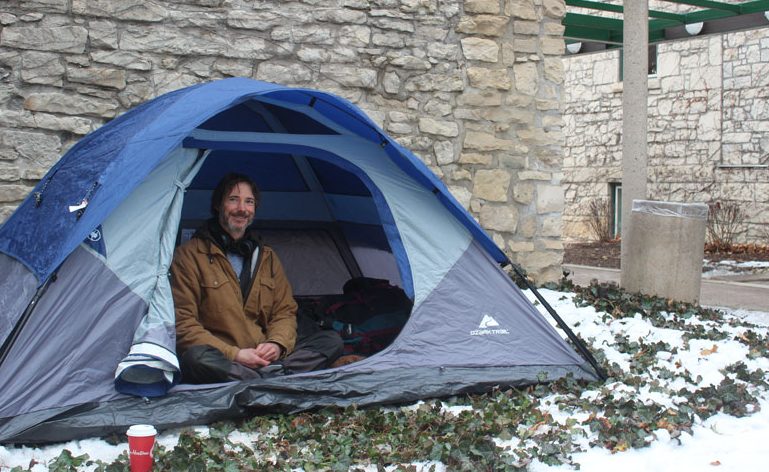GUELPH – While Wellington County and Guelph officials gathered with service providers for a symposium about health care and housing, members of the local homeless community pitched tents in a county courtyard downtown.
On Jan. 30, the first day of the two-day symposium, four people set up an encampment behind the Ontario Superior Court at 47 Woolwhich St.
Tucked between Wellington County buildings and parking lots, the quiet courtyard has trees, benches and garden beds abundant with dark green English ivy climbing stone walls.
It’s owned by Wellington County, and CAO Scott Wilson said, in his view, it’s not public property.
“This isn’t a park,” he told the Advertiser.
Within 24 hours of their arrival, the homeless people who moved to the courtyard were offered temporary shelter in hotel rooms – offers that advocate Greg Dorval said were too good to refuse.
It’s unclear how long they will be allowed to stay or how the rooms suddenly became available.
To Wilson, the county’s response to the encampment has been “very positive.”
‘Ambassador’
It was Dorval’s idea to set up camp in the courtyard.
As someone who recently found housing after being homeless for a year, he feels he’s “in a unique position to act as an ambassador.”
Because he’s no longer homeless, Dorval was not included in the offers for shelter.
Instead, a few hours after the offers were made, Dorval received a trespassing notice that required him to vacate by 9am the following morning.
“The trespass notice was prepared by the County of Wellington,” Guelph Police media relations coordinator Scott Tracey told the Advertiser.
“The Guelph Police Service assisted with serving the notice on the involved person.”
Dorval is adamant he will stay in the county courtyard, at least until the end of winter, “as a form of civil protest” in support of Guelph’s homeless community.
Though it’s not deterring Dorval, the trespass notice is discouraging other homeless people from joining him, Dorval explained, as is the regular presence of police and media in the space.
Building relationships
Dorval said he is still optimistic that more of his “homeless brothers and sisters” will set up in the courtyard, especially as moving there could lead to offers of coveted hotel rooms.
It’s a practical place for an encampment, he said, as the walls provide protection from wind, which in winter “is critical for survival.”
It’s peaceful there, too.
“Doesn’t everyone deserve a moment of peace now and then?” Dorval asked, taking a deep breath and pausing to appreciate the tranquil surroundings.
There are “people out here on the street,” he said, who haven’t felt safe enough to relax and take a deep breath for years – “or even a lifetime.”
But the primary reason Dorval pitched a tent in the courtyard is to build relationships.
He is hoping to meet county staff and work together to “take a giant leap” towards finding a solution to homelessness in both Guelph and Wellington County.
Though homelessness may not be as noticeable in the county, Dorval said many former county residents relocate to Guelph after becoming homeless.
A caring community
That’s because in Guelph there is a strong community of homeless people who support and care for one another, he explained.
The people who relocate from Wellington County “start out as the most vulnerable,” Dorval said, “because they don’t really know anyone.”
But over time, they become part of a close-knit community.
“If there’s a message for the general public,” Dorval said, “it’s that [if you become homeless] you will be loved by us.
“None of us want any of us to suffer. We are there for each other.”
He added, “I feel like I’m part of a family here, every day.”
Ideas for solutions
For Dorval, solutions should begin with “compassion and love.”
He wants to see a pilot project in Guelph and Wellington County similar to Finland’s approach, which includes finding housing for all homeless people, and then providing them with a continuity of care.
Dorval would have liked to be included in housing conversations at the symposium, but it was not open to the public and he did not receive an invitation.
Neither, he said, did anyone else he knows of in Guelph’s homeless community, though symposium attendees report there were about a dozen people with “lived experience” of homelessness at the symposium.
Wellington County social services administrator Luisa Artuso, who was involved with organizing the symposium, did not respond to the Advertiser’s request for comment.
Painful, relatable stories
Homeless people have difficult stories to tell, Dorval said.
“I think its really hard for the general public to hear such painful stories and that’s a sign of people’s empathy. They want to care … but it’s human nature to have this defence mechanism – if it’s too hard to hear … we shut it out.”
And it can be challenging how relatable the stories are, Dorval noted, “It’s hard for anyone to consider that ‘it could be me.’”
Dorval’s own story includes a 23-year career as a software and data architect.
But a decade of mental health struggles and years of facing then-undiagnosed chronic pain led Dorval to leave his career, and he became homeless shortly afterwards.
Dorval hopes his story shows people “no matter how many times you fall down, or how hard you fall, it’s worth climbing back up again.”
His experience with the health care system, which eventually led to an Ehlers-Danlos diagnosis, was significantly impacted by the COVID-19 pandemic, Dorval said. And he can see how the pandemic’s impacts go far beyond health care.
To Dorval, pandemic-recovery is an opportunity to rebuild services, rather than patching things back the way they were.




